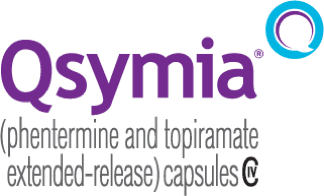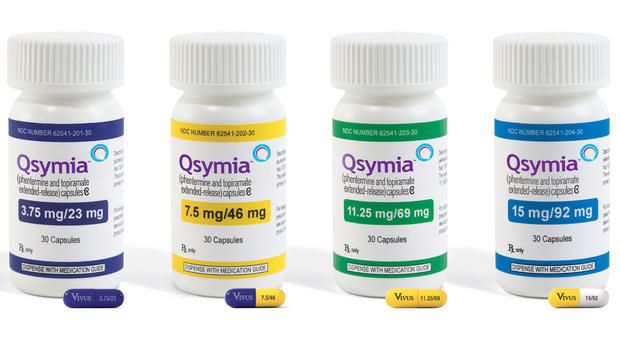Qsymia: A New Era in Weight Loss Medicaiton
Qsymia by Vivus Pharmaceuticals was the first new diet medication approved by the FDA in 15 years. After many years of frustration, the FDA concluded that most weight loss physicians already knew: it is almost impossible to lose large amounts of weight without some form of assistance.
The forces that tell some individuals to eat are so powerful they make “will power” almost useless over the long term. I am not talking about 10 or 15 pounds, but 50-100 lbs. and higher. The signals to eat converge on the appetite centers of the brain from the environment, nervous system, stomach, and even the body’s fat stores.
Qsymia is a combination of two older medications, phentermine and topiramate. This medication reduces appetite and produces fullness and early satiety, which results in significantly reduced food consumption. The result of this dual-action is rapid weight loss.
Dr. Lipman’s Experience Treating Patients with Qsymia
Individualizing Dosing of Qsymia for Maximal Weight Loss
Qsymia is a Class IV controlled drug and can only be obtained by prescription from a licensed physician. Each physician has to take a training course so he is familiar with the drug and its side effects.
I have treated hundreds of patients with Qsymia since its approval several years ago. Patients lost between 2.5 and 3.5 lbs per week over the average of 8 weeks. Many lost more in the beginning. Many who had a large amount of weight to lose took the medication for 8 to 12 months with excellent results.
Side effects were few and did not limit its use. I was able to eliminate most side effects by individualizing dosage according to patient responses. Many patients, especially older individuals, do very well on the starter dose of 3.75mg/23mg. A majority of my patients lose the most weight on the “recommended dose” of 7.5mg/46mg and elect to remain at that dose. I have learned that there is considerable difference in response to the medication from person to person. The most successful weight loss patients are those that take the lowest effective dose.
Dosages:
Qsymia comes in four dosage strengths: 3.75/23, 7.5/46, 11.25/69 and 15/92. The first number is the phentermine and the second is the topiramate. There are two starter doses and two treatment doses suggested. Each individual needs to start with the lowest dose and gradually increase the dose until he/she is receiving maximum benefit without side effects.
How Does Qsymia Work?
Phentermine has been used for over 60 years as an appetite suppressant. It is the most famous and widely used of all diet medications. Marketed as Adipex, Ionamin and Fastin, it has seen widespread use around the world. Topiramate (Topamax) has been used for a long time as treatment for headaches and seizures. Each drug has a different effect in the brain. Scientists believe catecholamine reuptake inhibition in the hypothalamus of the brain may result in reduced appetite and thermogenesis (increase in metabolism). Topiramate works by decreasing appetite and increasing satiety in another part of the brain.

Synergism in medication is the combining of two different chemicals, each one affecting the target organ along a different pathway yet producing results greater than the sum of the individual components. In the case of Qsymia, phentermine’s reduction of appetite combined with topiramate’s effect on cravings and satiety allow patients to achieve great weight loss results. This leads to increased efficacy with lower doses, often leading to fewer side effects.

The above graph shows the synergism of the two drugs that make up Qsymia.
How Effective is Qsymia?
This is a very effective drug for large amounts of weight loss. It is especially effective for those with cravings, compulsive eating and large appetites. The feelings of fullness produced by the drug are as important as the significant reduction in appetite. This is a drug approved for long-term use – months and even years.

Qsymia: Weight Loss in Patients Without Medical Complications
The graph above shows the results of a Qsymia clinical trial. It compares the weight loss results over 52 weeks of 680 subjects (that completed the trial) treated with either 3.75mg/23mg capsules, 15mg/92mg capsules, or placebo. Weight loss is expressed as percent change in baseline weight at 52 weeks.
The mean weight loss was 6.7% in the starter dose group and 14.4% in the high dose group compared to 2.1% in the placebo group. Weight loss in the starter dose group was over 3 times that of the placebo group. Patients in the high dose group lost almost 7 times as much weight as the placebo group.

Qsymia: Weight Loss in Patients With Medical Complications
This graph shows the results of a Qsymia clinical trial on subjects with comorbid medical conditions such as hypertension (high blood pressure), hyperlipidemia (high cholesterol), and diabetes. 1,542 subjects participated in the 52-week trial.
The mean weight loss was 9.6% in the low dose (7.5mg/46mg) group and 12.4% in the high dose group compared to 1.6% in the placebo group. Weight loss in the recommended dose group was 6 times that of the placebo group. Patients in the high dose group lost almost 8 times as much weight as the placebo group.
What are the Side Effects of Qsymia?
The most common side effects of Qsymia in patients taking it for up to one year were paraesthesia (tingling or pins-and-needles sensations most often in the hands, feet, or face), dizziness, dysgeusia (distortion of the sense of taste), insomnia, constipation, and dry mouth. This medication can cause a mild (2 bpm) increase in resting heart rate.
More serious, but less common side effects can include acute angle closure glaucoma, suicidal thoughts or behavior, depression, and anxiety. In some patients, Qsymia can cause cognitive dysfunction (e.g., impairment of concentration/attention, difficulty with memory, and speech or language problems, particularly word-finding difficulties).
Who Can Take Qsymia?
Qsymia is indicated as an adjutant to a reduced calorie diet. You can qualify for Qsymia therapy with the following BMI’s: 1. 30 kg/m2 without medical problems, or 2. 27 kg/m2 with medical problems. Medical problems include hypertension, diabetes mellitus and hyperlipidemia.
The effect of Qsymia on cardiovascular morbidity and mortality is unknown. Its safety when used with other weight loss products is also unknown. Do not take Qsymia if you are pregnant, planning to become pregnant, or become pregnant during treatment as it can cause fetal harm.
Qsymia is also contraindicated in breast-feeding, children under 18 years of Age, people with hyperthyroidism, patients taking monoamine oxidase inhibitors (MAOIs) or who have taken MAOIs in the past 14 days, patients hypersensitive to sympathomimetic amines, patients with glaucoma, and people with renal or hepatic Impairment.
The components of the drug have a 25 year proven safety record. After millions of treatment encounters and ongoing safety tests by the drug companies, the FDA is confident about effectiveness and safety of Qsymia.
Each individual needs to discuss the use of these medications with their personal physician to see which medications will be safe and effective.
Call 305-670-3259 to Make an Appointment with Dr. Lipman in his Miami Office


Learn More with Dr. Lipman’s Book: The Qsymia Plan for Weight Loss
Endocrinologist and weight loss expert Dr. Richard Lipman presents the first book focusing on the FDA approved weight loss drug, Qsymia. Dr. Lipman reviews the clinical trials of Qsymia and answers questions about whether Qsymia is for you; side effects, expected weight loss and how long a patient can take the medication. He presents a simple plan for weight loss that can be successful for you.

